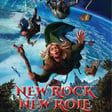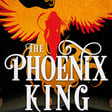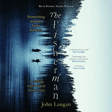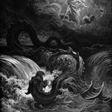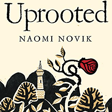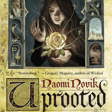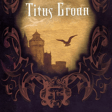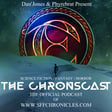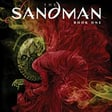Introduction to Crohn's Cast and Fritz Leiber's Influence
00:00:16
Speaker
Hello everyone, and welcome to Crohn's Cast, the official podcast of SFF Chronicles, the world's largest science fiction and fantasy community. I'm Dan Jones. And I'm Christopher Bean. Today we're talking about one of the all-time classic pieces of fantasy fiction, Swords and Devil Tree, by one of the godfathers of modern fantasy, the American author Fritz Leiber.
00:00:36
Speaker
Swords and Devil Tree is a collection of three novellas, The Snow Women, The Unholy Grail and Il Met in Langmore, which introduce Faford and the Grey Mouser, two of the genre's most well-known and well-loved characters.
Stephen Cox's Writing Journey and NHS Experience
00:00:47
Speaker
The stories have been hugely influential across the fantasy and science fiction genres, not least to Gary Gygax, the co-creator of Dungeons and Dragons, who cited Leiber and his heroes as a major influence.
00:00:59
Speaker
Joining us today to talk about Faford and the Grey Mouser is the author Stephen Cox. He is the author of science fiction drama Our Child of the Stars about an alien child left on earth by his people and who ends up being named Corey and raised by Gene and Molly Myers in 1960's Small Town America. He came to writing through several false starts including role-playing and poetry. He's written over 90 short stories and sold three of them.
00:01:26
Speaker
Outside of writing, he works in communications for the UK National Health Service and has to make science accessible to the public despite not being a scientist himself. His latest novel and sequel to Our Child of the Stars, entitled Our Child of Two Worlds, is published this very week by Joe Fletcher Books. Welcome along, Stephen.
Impact of 'Swords and Devil Tree' on Fantasy Genre
00:01:46
Speaker
Welcome. Thanks for having me. We'll get straight into it. Swords and Devil Tree.
00:01:51
Speaker
and Fafford and the Grey Mouser, what made you select this classic slice of swords and sorcery?
00:01:57
Speaker
Well, I think the first thing about it was I remember having read them a long time ago and having reread some of them more recently. And I just actually think that at their best, they're great fun. And I think that it's interesting because the stuff which age, most stuff that's written a long time ago, Leiber started writing in the 30s and carried on writing till the late 70s. So he died 50 years ago.
00:02:26
Speaker
and yet 40 years ago. But still, there's some good stuff about it. I mean, one of the things is how influential he is. And without sort of going through the entrails of fantasy, it's interesting to see how many different strands of fantasy and science fiction and cosmic horror actually go back to Leibach.
00:02:49
Speaker
I think that he's praised. I don't know how much he's read now, which is interesting. My very quick searches around suggest to me that people are basically currently now drawing from the comics. And that's where most people now seem to know him. I mean, my daughter is 30 years younger than I am.
00:03:11
Speaker
she's never heard of him.
Faford and the Grey Mouser: Complex Characters
00:03:13
Speaker
So the books themselves and one of the odd things when we start talking about the books is that there are these collections but they're not faithful to the order he wrote them in. So he wrote his very first story at the end of the 30s and quite a few of the stories are written in the 40s and yet when you come to Swords and Devil Tree actually two of those novellas are written in the 70s.
00:03:37
Speaker
So I always think of Ilmet by Langmar in Langmar as being like the Ur story. I mean, it's the origin story where the two of them meet and it's got in it all. It's like it's a seed from which the whole of Phather in the grey mouse grows. It tells you about the world. It sets the tone.
00:03:56
Speaker
which is funny and dark and cynical and you know it's not in those sort of senses it's actually quite modern and we think that writing grim fantasy where most things rubbish is new and obviously it isn't so I think partly because he had fun with it and I think you can have fun reading it but I mean you know there's a lot more to it and some of it has aged rather badly
00:04:25
Speaker
So you've got these two characters, and they do leap out of the page and people do like them, one of whom is the more silent, very tall barbarian Fathrid, with a big sword who whacks things, and the other one is the Grey Mouser, who knows a bit of magic, but is basically a swordsman and a thief and more sneaky.
00:04:44
Speaker
and you see the sort of stereotypes coming out, except they're not really born through in this. So, for example, by and large, Mauser takes bigger risks, and Fathrid, although he waxes with his sword, is not stupid by any manner of means, and he's quite determined not to have to fight overwhelming odds, and says, I don't take on more than two swordsmen at once if I can possibly help it, and is probably more likely to be careful retreat. So,
00:05:13
Speaker
And it's a buddy movie, basically, because these two guys go around, sometimes they're fighting each other. Often they're working together. Sometimes they end up working across purposes.
Leiber's Influence on Comics and Games
00:05:23
Speaker
And each of them has their own supernatural wizard who comes and gives them ridiculous orders that get them into trouble. So the world is
00:05:35
Speaker
The world building is good enough. Certainly at the scene level, at the actual scenario level, I think that the stories are good. I think that Narrowon as a whole, I'm not so
00:05:49
Speaker
some of it sort of sketched in, like, you know, the mingles are kind of the mongols and I don't think it gets much smarter than that. But, you know, I mean, so I came into fantasy through Wizard of Earthsea, I've also
00:06:06
Speaker
You know, I also role-played a lot, because you see bits of books reflected in things, you go back to it, and the great city of Langmar and Fathir in the Grey Mouser feed into all sorts of games and comics and role-playing games and other people.
00:06:25
Speaker
Well, that's a hell of an introduction. Yeah. Attempted to wrap the episode up right there. No, there's a heck of a lot to unpack there. Let's go, let's go right back to the beginning.
Cosmic Horror and Fantasy Settings
00:06:36
Speaker
You mentioned that there are elements, maybe not so much in Swords and Devil Tree, that collection of novellas that was, you said it was published in 1970. Certainly you all met in Langmuir, but I believe Snow Women and Unholy Grail were maybe slightly older than that, I think.
00:06:52
Speaker
And but yeah, they not so much but you mentioned cosmic horror. And there certainly is cosmic horror in some of the some of the adventures went when they maybe move past the conventional
00:07:06
Speaker
run-ins that they have, for example, with the Thieves Guild and the colourful characters of Langkmar and Library starting to expand what he wants his two heroes to do. There is more cosmic horror element to it. And he's carrying on a lineage that goes back to Lovecraft and the two of them were epistolary correspondents. I mean, Lovecraft
00:07:29
Speaker
It's well known to people who know Lovecraft that he was a literary correspondent of such huge magnitude that perhaps only Voltaire can stand with him in terms of sheer quantity. And he was incredibly influential. And one of the things that he did influence, one of the people that he did influence was Fritz Leiber. And as far as I'm aware, he was the one who convinced Leiber to make
00:07:58
Speaker
Fafford and the Grey Mouser into not a historical fiction piece, but a fantasy piece. The original set of Lancmaas was I think supposed to be an avatar for London or a London type town.
00:08:13
Speaker
and it would be set in whichever century, the 15th, 16th, 17th, whatever it might have been. And Lovecraft said, I think you'll do a lot better out of this to make it a fantasy and make it a secondary world piece of fiction. So we've got Lovecraft to thank for that. And so without Lovecraft, you might not have all of these fantasy offshoots. You might not have Dungeons and Dragons. You might not have any of this stuff. So he's an important footnote in the history of Faford and the Grey Mouser.
00:08:42
Speaker
And yeah, the influence, you're quite right, it's huge, it goes through not just Dungeons and Dragons, but into computer gaming and other sorts of gaming and comic books and all the other areas. Let's go back to the characters. You mentioned Fafid, yeah, he's a big guy, he's like seven foot tall, he carries a big sword and he hits things, and he hits things well. And you've got Grey Mouse, who is more subtle.
00:09:07
Speaker
a bit shrewder, slightly darker, I think. There's more darkness in Grey Mouser than in Faford, although we do get the episode in Snow Women where he attacks the Corsair with a face like death, as his lover, Volana, describes it. But they are balanced characters. So we'll go and talk about the individual stories in a little bit. But it's important to know that, and I think you made a good point,
Challenging Fantasy Stereotypes
00:09:34
Speaker
Big, big barbarian hits things with a stick, but he's quite cultured, or at least he aspires to be quite cultured. In the Snow Women, which is the first novella in where we see him, essentially the circus comes to down into the snowy waste, the barbarian waste in the north where Faford lives, the circus comes to down and he's obsessed with civilization and he wants to be part of it, he wants to go exploring.
00:10:00
Speaker
And he wants to get involved, and that's how he meets his love of Lana and gets into the conflict with the corsairs, the pirates. So yeah, he's not big dumb barbarian. He's not a Conan type character. There's a lot more complexity to him. And the same with the Grey Mouser. He's small, and he's subtle, but he's also very, he's quite aggressive. He's quite artful. And he's got quite a dark heart at his center. What do you think about the characters themselves?
00:10:29
Speaker
I think that the I mean, I'm very interested in the psychodrama that's going on in the ice women, but I think that they are. They are good characters, they do pair, they do, they do pair off each other. And we talk about influences, and I think that Fathrid is probably a bit of a Mickey take of Conan, as every Conan story that was ever written was published in about a six year period in the 30s.
00:10:59
Speaker
And then Leber is two years later in the same circulating among the same magazines. Howard, who wrote Conan, was corresponding with both Lovecraft and Leber. So I think Conan is a character based on the assumption that force is right. Force with guile is good, but force is right. And the civilization is a bad thing.
00:11:25
Speaker
And very much that's not the case. And I think one of the reasons I like them is because they're characters that operate at the bottom of the sea, up an ice mountain, shrunken down and running around in the sewers, mouse size, all things they do, sailing the seas, going in foreign lands.
00:11:41
Speaker
walking through endless forests endlessly running into towers that are haunted and reputed to have treasures in them, but actually in a sense the city adventure where you need to be able to fight but also think and talk your way out of things. So I think that to me the city adventures are some of the most exciting and I think that, and we talk about influences, I mean just quickly to run through it, the idea of a thieves guild, an assassins guild, a beggars guild, pubs with silly names,
00:12:12
Speaker
all the church, all the temples of all gods are all in one place. The government's incompetent and corrupt and the law is terrible. Religions, the religions are awful. You know, all these sort of things that you run into time and time again in fantasy worlds, you know, they go back to Langmar and Fitzleiber and some of them go a little earlier.
00:12:37
Speaker
Cavantes has a story where two people try and join the Thieves Guild in a seaside port, which is about 300 or 300, 400 years earlier. Anyway, I think that they do jump out because they are a bit more subtle than they could have been. I think it's quite interesting that there's definitely a development, particularly in their relationships to women, because the first story in Swords and Devil Tree is about a man escaping from his
00:13:07
Speaker
dominant mother, which fits in with a lot of Leiber's Jungian hang-ups. But they have quite an adolescent attitude to women. Women are wenches, women are short-term partners, love them and leave them. And Ilmet by Langkmar, they are, spoilers, have their two girlfriends come to a tragic end. But they sort of do tend to... Well, I think Ilmet in Langkmar even is an important
00:13:37
Speaker
not a way, it's not a coda because it's written towards the end of, you know, chronologically, it's written towards the end of his cycle of stories about Faford and the Grey Mouser, but it serves as
00:13:48
Speaker
Yeah, the point where they grow up and they are sort of young and boisterous and they drink and they fight and they get into scrapes and it's all revelry, you know, and it's like Inilmeth in Langkmar. Okay, so here's the line. Inilmeth in Langkmar, it goes from revelry to devilry and they realise that this is a
00:14:11
Speaker
You know, with life comes death, and even falling in love, because they do both fall in love. They fall in love with Vlana. If Halford falls in love with Vlana, and Grey Mouser falls in love with Ivrian, they fall in love, and they learn that with love comes the price of death.
00:14:29
Speaker
And so it contextualizes everything that comes after chronologically or before in the publication timeline. It sort of qualifies it with a lot more complexity and depth. And I think there is a sense, certainly
Psychological Complexity in Fantasy
00:14:45
Speaker
at the moment. And there's some questions from a writer's perspective that maybe we could formulate around this. There's a certain aesthetic
00:14:55
Speaker
that fantasy and certain science fiction has. And in fantasy, certainly not classic fantasy or medieval fantasy, we might call it, that is very much informed and formulated on the basis of the Fafford and the Grey Mouser stories. Because of the, well, like you said, you get, Langmuir is like the prototypical fantasy secondary world, certainly for low fantasy.
00:15:22
Speaker
and there's it gives it gives fantasy an aesthetic quality but it also kind of implies or gives the impression that there's not much going on beneath the surface so fantasy you know we i mean chris and i chris chris and i will um will know will tell you that um
00:15:41
Speaker
Fantasy in science fiction maybe suffers a little bit reputationally because it's not taken seriously in some quarters. I think that's changing actually at the moment, but I think a lot of it is because it has this aesthetic value, or this aesthetic veneer, which is essentially false because it's not real and it's based on certain things, but it's not real.
00:16:01
Speaker
but it suffers. There's a propensity to dismiss everything that lies beneath the aesthetics because that's false, so everything else underneath it must be false as well. But like you said, there's a real psychological complexity to Fafford and the Great House. So I think you can have more psychological truth in a world with made-up stuff than you can have in a world that has nothing. Everything conforms exactly to our world, but the people are psychologically and creatively.
00:16:31
Speaker
cardboard. So I read books in which people can read it. I strongly agree with that. Yeah. So I'm not going to keep plugging my own book, but the fact of the matter is that it's based around the love of a mother and in due course a father for the child they adopt. And that is a dramatic and driving human force to not have children, to acquire a child, for that child to be under threat, whether it's illness or anything else.
00:16:59
Speaker
and then to risk losing that child is a emotional motor that runs perfectly well if that child is as crash-landed in a spaceship as well as he does in anything else. That's why if you get that emotion right you can reach
00:17:14
Speaker
beyond the people who read just limited certain one wing of science fiction. I'm not saying it's all science fiction.
Advantages of Low Fantasy
00:17:22
Speaker
You can reach people who normally don't read science fiction because they don't get the emotional and relationship stuff that they get from other fiction. You're right. There's actually sense that these people are not cartoons and that they have
00:17:39
Speaker
They have honor of a sort. There are things that they won't do. They are sometimes chessboard pieces for higher powers, but it is low fantasy in that they are surviving episode to episode, not on a single overarching quest dictated by the ancient prophecy that means they have to end up as king or whatever.
00:18:08
Speaker
And I think low fantasy actually has a lot of advantages because all sorts of, you know, you can even get into all sorts of scrapes with, and it can be the main story. I mean, I love role-playing and dungeon mastering city adventures because you have to have brains as well as brawn.
00:18:25
Speaker
I guess another advantage of low fantasy is that you can put these origin stories in like Snow Women and The Unholy Grail. It really serves as a prologue for the rest of the adventures and they work perfectly well. They work really well as standalone stories.
00:18:44
Speaker
your notes about Our Child of the Stars and Our Child of the Two Worlds as well are quite pertinent, in fact, actually, because that is a story, especially the first book is a story about a mother and it's from Molly's perspective, the mum. And in Snow Women, I think
00:19:01
Speaker
You know, it's a really interesting take on a matriarchal society. It's a strong, I mean, you said he was a Jungian, but actually, I think it harks back to Freud as well, because there's a lot of Oedipal overtones that are going on in the Snow Women.
00:19:18
Speaker
just to give a quick trace of his plot. He lays it on with a trowel. He does lay it on with a trowel. And it's very funny, Snow Women. In fact, it's quite broad and slapstick. I mean, just to give a quick trace of it, it sets up Faford as this
00:19:37
Speaker
huge seven-foot barbarian, he's 18 years old, but he also happens to be completely under the thumb of his mother, Moore, and it's Mara, isn't it, the one to whom he's betrothed, who are huge, shrewish women who are sort of on his case all the way and say, right, this is what you're going to, this is your life. And the women are quite funny, you know, they attack outsiders by throwing these massive snowballs at them, over-arm like big strapping fast bowlers.
00:20:04
Speaker
And it hurts and they drive out the men who come in and try to take advantage when they come in from the bazaars or the shopping caravans that come into the town, they drive them out. So it's quite broad and slapstick.
00:20:20
Speaker
There's a serious point there, which is that Faford, as somebody who has quite a deep yearning, he reminded me of Huckleberry Finn, actually, when I was reading it. I was reading it and I thought he keeps using the word civilization.
00:20:36
Speaker
To contrast with this, whether it's a matriarchal society or not, it's plonked in the middle of the northern wastes. It's an icy, desolate wasteland, and there's not a great deal going on. And he wants civilization. He wants to see the world. He wants to see some adventure.
Civilization and Matriarchal Society in 'Snow Women'
00:20:56
Speaker
This female-dominated society is saying no, and it reminded me of it had echoes of Lyra in Northern Lights. We did the episode with Stephen Palmer on Northern Lights about the female version of the totalitarian.
00:21:12
Speaker
It's not brutal and cruel and sadistic in the way that the male totalitarian is. It's restrictive, it's smothering, and it's limited, it's bounded. So it puts strict boundaries on things.
00:21:28
Speaker
So I thought that was, you know, and the male totalitarian totalitarian is there as well. It's in The Unholy Grail story. So I thought it was a very interesting origin story to put him in. And you're quite right. He's got these Jungian hang ups, hasn't he?
00:21:42
Speaker
Yeah, so to quickly run through, I mean, it's almost, it's certainly, I don't, it's not intended to be queer coding, but Fathred wears white robes, which is what the women wear, he's clean shaven, he's still sleeping in his mother's tent at the age of 18, and he's a bard, but he's trained to sing in a high voice.
00:22:04
Speaker
So these are all exemplars of the fact that, you know, he's seen as being under the thumb of his mother. And so he's made, he has to break through and become an adult in a sort of fairly straightforward way by busting an escape and going off and being a wild adolescent, roistering in Langmar. But it's a
00:22:29
Speaker
Yeah, I mean, I have to say that to the modern eye, there's a lot of trouble with some of the representation of women. Some of the later books, not so much in the one that the collection that we're talking about, the Mauser, it starts getting very obvious that the Mauser particularly likes women a lot younger than him.
00:22:49
Speaker
And there's a certain amount of tying up that goes on, you know, that's unpalasable for lots of people. Yeah, because you've got this, I mean, it's good when the women, the women become more characters in their own right. And there are stories later on where the women rip the men off. And there are stories, as you say, where they start to get, find new loves after their great lost love, their great lost loves, lost in the story.
00:23:18
Speaker
Yeah, I think you're right about Mouser. He can be quite, like we said before, he's got a bit of a dark heart, and he can be quite unsavoury at some points in the other stories. And it could be that Leiber, when he wrote Il Met in Langkmar to sort of tie the whole thing together, that it serves as a bit of an explanatory point.
00:23:39
Speaker
for the way that these characters act in certain situations. And we shouldn't be overly simplistic about the way that, you know, saying old Lebo is problematic because he writes women in this way. The women, certainly in Swords and Devil Tree, are highly rounded characters. And there's a broad spectrum of female characters. Let's move on to Ivarim, because we talked about
00:24:06
Speaker
More, Faford's mother and Mara, his betrothed. But Ivrian is Greymouser's lover. And he, well, we get the impression that they've already met. They've met prior to events in the unholy Grail. And Greymouser is captured by
00:24:27
Speaker
Ivarian's father, who is the Duke, and is set to be tortured and using some magic, he manages to escape. But the Duke, and I forget his name now, you're going to have to remind me, the Duke is the totalitarian male. So he's the counterpoint to Maul, Fafr's mother.
00:24:48
Speaker
in Snow Women and he is the, he's brutal, he's sadistic,
Ivrian and Vlana: Character Contrasts
00:24:53
Speaker
he's cruel, he wants to take pleasure in torturing Grey Mouser and he is completely, he completely rules his daughter with an iron rod and takes pleasure in pushing her in ways that she doesn't want to go. So, and she breaks free, she's completely different to Vlana, Fafr's lover in that
00:25:14
Speaker
she's quite timid, she's scared, she's not uncertain of herself because she's being ruled by a tyrant, whereas Volana is capable, she's calculating, she knows the world, she's more worldly. Yes, I don't have much of a response to that. Others say that I read somewhere that I thought was
00:25:34
Speaker
quite interesting that Leiber wrote in various genres, female characters, and he said his intention was that if men think women are irrational, it's because men create societies that drive women to be the way they are. So I don't think he was lacking in insight. No, he wasn't lacking in insight at all. I think that
00:25:57
Speaker
There's quite a lot of sophistication in the way that he deals with women. Let's talk about the go back to the world building that the fantasy seems to have and go back to that aesthetic. And because I mentioned before that I had some, you know, we could probably think about this from the perspective of writers as well.
Creating Innovative Fantasy Worlds
00:26:16
Speaker
So you're writing fantasy and fantasy is a much broader church than it would have been 50 years ago. And
00:26:23
Speaker
That's clearly a good thing because there's only so many times that you can reheat the story of Afford and the Grey Mouser in Langmarra, in whatever guise. But there is still possibly the obligation to do that secondary world building. So I wonder what's your thoughts about navigating that? Yeah, I think that...
00:26:50
Speaker
I think one of the first things is I see a lot of people... I've written fantasy mostly in very short forms. I think that there's a great desire for people to think that you have to have a ring binder like a campaign so that you actually know everything there is to know about the magic system and the animals and so forth. And I think you can get a long way on authority.
00:27:12
Speaker
which is the ability to write with enough understanding of what you need for now that people don't see that you're busking.
00:27:23
Speaker
And I think actually playing D&D is a good preparation for writing fantasy because it, or any other role-playing game, it encourages you to think of silly ways round things when you throw them in. You know, can I cast a wall of stone on a ship? Can I cast what happens if I use my telekinesis spell on sharp stones? All that sort of stuff. So the sort of mind that looks for loopholes.
00:27:47
Speaker
So I think that, so Conan, for example, quite deliberately, what Howard did was write, he knew a lot about the ancient world, but he didn't want to be caught trapped in any one time. So what he did is he lifted different countries at different times, gave them archaic names. And so he pieced together a world which is quite obviously based on ours, but sort of fantasy and added magic and so on.
00:28:12
Speaker
Leiber does some of that. Close up, he tends to come up with, he tends to do things that are more interesting. I mean, I'm very fond of the one true novel in the Langdon series, which is the last one, where there's a problem that turns out, spoilers, to be that there are sentient rats running, trying to take over the city. So they have to shrink down to a small size and go down into the sewers. I think only the mouse, the grey mouse does that, ironically.
00:28:43
Speaker
And there are aspects of the world building that are actually very interesting and thought through and so on and so forth. And sometimes the wastes are just hounding wastes or sometimes wastes are just hounding wastes and you don't have to have to focus on them. I mean, people get a sense of reality from detail because the world is broken up into very small, you know, if you go into a village and discover that's the village where on the third full moon of the year,
00:29:11
Speaker
they're going down around these trees, that's the sort of thing human beings do and so it sort of starts to make you think you've got real people there, but also having the people in it react appropriately to what happens helps you ground it, the emotional side of it grounds it.
00:29:27
Speaker
Fantasy readers don't go in desperate to tear a new story apart, but you do need to leave no obvious holes for them to get through. No, I think it's more the fantasy writers. I think it's a hang-up that writers have, more than the readers in many cases. I think we've got Swords and Deviltune and Fafin and the Grey Mouser and these stories.
00:29:52
Speaker
And they especially the early one so if we go back to snow women and the unholy grail, there is a lot of and there's a there is a very small prologue at the beginning of swords of devil tree called induction which we haven't talked about but it literally is just what two pages and it's it's introducing the world of.
00:30:10
Speaker
I had a one which is no when backwards and not set in any particular time in space i don't know one is the world and like mars the city and it's a page and a half of introduction but he is.
00:30:23
Speaker
He does have the propensity to use the long flowing flourishes of descriptive language that Lovecraft did as well. So I suppose A, it would have been in vogue, certainly when he was starting writing these stories in the 30s, probably through the 40s as well.
00:30:44
Speaker
But because there wasn't much of this secondary world building happening prior to people like Liber and Lovecraft, so he was at the vanguard of creating this, the sense of this detailed secondary universe in which these adventures can take
Medieval Fantasy: Immersion through Tropes
00:31:01
Speaker
place. Now it's, the vein has been well tapped by writers all over the world. So I think, personally, I think the detail comes in other ways. So you can still, there are still
00:31:14
Speaker
There's still scope for creating something brand new, which science fiction and fantasy gives you the license to do. But if you are aiming for a more medieval fantasy, I think you can plunge yourself into the action in that world in medias rest almost because it's such a well understood environment in which people can read and write and play.
00:31:41
Speaker
I just wanted to say Smoke Ghost is one of my favorite short stories. Tell us about Smoke Ghost. I've not read Smoke Ghost. Well, it's just a short story about... Well, no, I don't want to really want to say it because it spoils it. It's so short, but it's an invention of... It's a reinvention of something coming to get you. There's something very Jamesian about it. And also, it's to do with the time of when
00:32:09
Speaker
pollution and those kind of things we're encroaching on the society a bit more so. But it's just it's just about a man who sees something coming nearer every day. And it's just a very, it's just a really lovely story. I really enjoyed it. And that's not like Mr. James, even just from that small description. Yeah, exactly. I mean, it's very updated. I'm like James.
00:32:32
Speaker
We come to them with new understanding, certainly, I think from the storytelling and the psychological perspective, certainly. I think early science fiction, and specifically science fiction, it may suffer because the science can be
00:32:47
Speaker
proven incorrect rather quickly as the technology and science allows the real world to observe. An example would have been even in the first half of the 20th century, there were several stories and short stories and the big one marked the War of the Worlds in the late 19th century about invaders or people from Mars.
00:33:10
Speaker
in theory, entirely possible because there was no detailed observation on what was going on on the Red Planet. And then all of a sudden, in the 1960s, they produce some photographs of the surface of Mars and it's just a dusty rock. There's like nothing going on there. Oh, okay.
00:33:28
Speaker
and all of a sudden these stories can be seen to be obsolete. Of course they're not because there are layers to them and it's going back to the argument about the aesthetic of science fiction and fantasy. If you think the aesthetic is the only thing then you're missing a lot but actually there's still a lot going on underneath the hood.
00:33:48
Speaker
No, I mean, that was I was just curious as to this discussion about obsolete sci
Debating Sci-Fi's Relevance
00:33:55
Speaker
fi. And, you know, not that that was a word was used, but old sci fi. I think that might have a more finer
00:34:04
Speaker
definition in terms of whether it's so-called soap opera sci-fi or soft sci-fi as a hard sci-fi because I mean I'm sure there's stuff I've read in Arthur C. Clarke that are obsolete now but I've really enjoyed those stories even though he's awful with characters and and with emotional connection with the characters there's something about sci-fi it doesn't matter if it's obsolete I think it still ticks that escapism that
00:34:30
Speaker
that sort of fantasy box. I can't really comment too much on fantasy because I don't read that much as science fiction and horror, but it's interesting. Well, even if science fiction does
00:34:44
Speaker
Let's say it's rendered redundant, only again at that aesthetic level, at that superficial level, because there's a deeper layer to all of these stories, which is psychological. And like you said, Stephen, there can be greater levels of truth in the secondary world.
00:35:02
Speaker
Just because a science fiction story may be rendered redundant on the surface, those old stories can still hark back to the call to adventure because that's essentially what they were. They were the human spirit dreaming, like rendezvous with Rama. I know it's one of your favorites, Chris. It's about the call to adventure and the call of humanity to reach for the stars. That's essentially what
00:35:29
Speaker
Faford and the Grey Mouser. Certainly the origin stories are about that as well. Certainly for Faford, the Grey Mouser is a bit more of a Royster-Doyster, I think,
Faford's Character and Leiber's Life Experiences
00:35:40
Speaker
than Faford. But Faford wants to see the world, and his origin story is a call to adventure and a desperation to broaden his own horizons. I think there's a lot of Faford in Lyba himself, because he had a very peripatetic life.
00:35:58
Speaker
He lived all over America, he lived in New York, he lived in New Jersey, the Bay Area, Chicago.
Themes of Travel and Adventure
00:36:04
Speaker
And I think he was quite a big guy as well, as far as I'm aware. So I think he saw a lot of himself in Faford in trying to make that character who wants to go out and have these different experiences. Traveling, inducing traveling is all over Swords and Devil Tree.
00:36:25
Speaker
Where do you think it goes next? What can it do? Or how much life is left? So I've got an emotional feeling and some intellectual backing for it that we're not going to run out of stories. And you look at all the stories that we've told over time.
00:36:39
Speaker
And let's take one example that keeps turning out, which is the child who's born under mysterious circumstances, who's brought up not by their own parents or their own parents are different orders of being. That child is sheltered, encounters various dangers, and turns out to be significant and special. So that story
00:37:00
Speaker
is Moses, and Jesus, and Hercules, and Superman, and it keeps coming out. So people say, you know, your book's a bit like ET, and I say, yeah, and ET's a bit like Moses. You know, there are these tropes, and a trope is not a cliche, just because something has been done several times before, it can be done again with a different emotional energy, it can be done with a different imaginative framing,
00:37:31
Speaker
I'm glad you've made that clarification because there's a sense that maybe a trope is a negative or a disparaging, you know, it's used in the pejorative quite a lot of the time. But, you know, it's a trope for a reason. And we sometimes forget that.
00:37:45
Speaker
Let's be clear, people still are going to want to read stories about falling in love and that things get in the way of falling in love and the relationship doesn't run smoothly and so on. I'm actually, in some ways, I think how you survive the relationship and live in the relationship is also very interesting. But nobody's going to stop reading Boy Meets Girl, Boy Loses Girl stories because a lot of us are hardwired to be very interested in that.
00:38:15
Speaker
and they can be endlessly done with variations. Yeah, I completely agree. These stories are timeless and I think that's why fantasy and science fiction does give us so much possibility because it can retell the same stories without the constraints of the physical objective reality of the world in which we find ourselves. It can
00:38:39
Speaker
it can break down the borders and tell it in completely different ways that are relevant to every new generation that comes along. So I think that's probably a good point at which to take a break. So we will stop it there and we'll join Steven a bit later in the episode. Hello SSF Chronicles. I'm ringing on behalf of a wizard whose head fell off. I was onto the corporation but they said to give you a shout. His name is Shelby.
00:39:08
Speaker
and his head goes by that name too. I reckon it probably fell off in or around the kindergarten bus stop on Saturday. It was very windy that day. Now even so, it couldn't have gone that far. The only way can move is by wiggling his ears or maybe rotating its jawbone. But there's no sign of it anywhere on the main street and to be honest, it's starting to freak me out. Because I'm his apprentice and I can't for the life of me tell what way he's looking. Now I'm not going to be on the dollar store or anything, just, you know, it'll be good to know.
00:39:34
Speaker
Plus, I got a spot with tickets to see the new Batman film, so could you let me know if anyone drops in a wizard's head tea? Especially a bad-tempered one. Believe you and me, you'd be doing yourselves a favour getting shot at it. Thanks.
00:39:49
Speaker
Hello, I'm De Morris Brown, and this is The Judge's Corner, where I talk about legal matters of potential interest to writers. This month, I'll again deal with an aspect of the law which we can use in our stories. And since this talk is sandwiched between two others dealing with the risks that authors run as regards defamation actions, I thought I'd look at how over the years English law has considered slander and libel, and what these legal concepts can bring to our world building.
00:40:18
Speaker
I said in my first talk that defamation's origins lie in the importance of personal reputation, but the real politic behind it is the state's need to avert unrest and breaches of the peace. Insinuations of wrongdoing or disease can create social upheaval within a small community, and an angry insult can all too easily lead to brawls and public disorder.
00:40:41
Speaker
Legal actions for defamation aren't modern innovations. Roman laws codified under Hadrian allowed disgruntled citizens to sue for both privately uttered defamation and for insults shouted in public. Later, written defamation, particularly anonymous pascuanards, carried harsh criminal penalties.
00:41:02
Speaker
under the Emperors Valentinian and Valens in 365, even if someone simply found such a document, then, if he does not immediately destroy these papers, or throw them into the far, but makes the contents known, he will be subjected to capital punishment, as if he were the author of such offence.
00:41:23
Speaker
The customary laws of Germanic tribes also addressed the issue of defamation to avoid disruptive, private retribution. Under the Salic law of the Franks, calling a man a wolf or hare brought a penalty of three shillings. For falsely stating that a woman was unchaste, it was 45 shillings.
00:41:43
Speaker
Elsewhere penalties were harsher. Under early Icelandic law, a man accused of cowardice had the right to kill the person maligning him. And in England, Alfred the Great decreed that a slanderer should have his tongue cut out, unless he paid sufficient compensation for his offence.
00:42:02
Speaker
Although defamation actions in England were initially held by local menorial or borough courts, the Church claimed jurisdiction over a great swathe of what we now consider secular law, and its involvement in defamation was codified at the Council of Oxford in 1222, which stated,
00:42:20
Speaker
We excommunicate all those who, for the sake of hatred, profit or favour, or for whatever other cause, maliciously impute a crime to any person who is not of ill fame among good and substantial persons.
00:42:35
Speaker
Since the slander had to relate to a crime, mere abuse wasn't enough to bring a case in the church courts. But actions punishable as crimes were plentiful in the medieval period, and no distinction was made between the secular and ecclesiastical offence. As a result, calling someone a thief was actionable, but so were imputations of heresy or adultery. And while calling a woman a scold wasn't defamatory, calling her a strong harlot was.
00:43:06
Speaker
Although excommunication was the ultimate punishment, most cases were dealt with by the defendant apologising in public, often in church during a service to have maximum impact. In one case at York, the defendant was required, at the time of high mass, the parishioners being present, to say in a loud and intelligible voice that he had erred in his words, which were uttered from false information of others, and to humbly ask pardon of the complainant.
00:43:36
Speaker
Similarly, in Scotland, before the Reformation, offenders had to appear before the altar at high mass and ask forgiveness, or to make a formal statement of retraction at the location where the offence took place. In 1285, the church's jurisdiction in England was confirmed by statute, but it was also curtailed. And in the cause of defamation, it hath been granted already that it shall be tried in a spiritual court, where money is not demanded.
00:44:05
Speaker
That is, if a complainant sought monetary compensation, he had to bring his claim in the menorial courts. In practice, though, it may well have been the case that a defendant could redeem a public penance or other spiritual penalty in the church court by negotiating a financial payment instead.
00:44:25
Speaker
and cases were a significant part of church litigation. In 1438 in Rochester, of some 90 cases heard, 17 related to defamation. In Litchfield, between 1465 and 67, out of 259 actions, 45 related to slander.
00:44:46
Speaker
and between 1572 and 1640 over 2,200 defamation cases were brought to court in and around London, a steady trickle of some 30 to 40 a year. By this time the definition of what was slanderous had widened to cover not only imputations of crime and immorality
00:45:07
Speaker
but also of having diseases such as leprosy or syphilis, as well as any statement which prejudicially affected a man's reputation in his profession or occupation, or which caused specific damage in some way. But for peers of the realm and other important men, slander was more widely defined as a result of the 1275 offense, Descandelis magnatum, slandering the magnates.
00:45:34
Speaker
And this said, Where as much as there have been afore times found in the country, Devise as of tales, whereby discord or occasion of discord hath arisen, It is commanded that none be so hardiest to tell or publish any false news or tales, whereby discord or occasion of discord or slander, May grow between the king and his people, or the great men of the realm.
00:46:00
Speaker
In effect, this made any criticism of the king, his nobles and officers illegal. And as the repeated discord or occasion of discord indicates, it came into being as a result of prevailing social unrest and fears have revolved.
00:46:16
Speaker
A hundred years later, under Richard II, who at the age of fourteen was literally confronted by the Peasants' Revolt, the provisions were twice re-enacted, again speaking of devisers of false news and of horrible and false lies, whereby great discord hath arisen, and whereof great peril and mischief might come to all the realm if due remedy be not provided. Notwithstanding the laws, though,
00:46:44
Speaker
During Richard's reign slander and false lies and the resulting actions and counter-actions for defamation seem to have formed a lucrative industry for lawyers as opposing factions sought control over trade and administration in London.
00:47:00
Speaker
Although scandal and magnatum, as it became known, started as a criminal offence, dealt with in the infamous Star Chamber, in due course the nobles began to use it in civil proceedings through the king's courts, which were resting jurisdiction away from the church. The first attempt in 1497 was dismissed, but in 1512 the Duke of Buckingham won £40 against a man who said he had no more conscience than a dog.
00:47:29
Speaker
The use of the statute by the nobility to bring civil actions for insult alone accelerated as their military and political power declined in the 16th and 17th centuries, though it effectively came to an end in 1710, long before the statute itself was abolished.
00:47:46
Speaker
Meanwhile, just as prevailing unrest in the 13th century led to the criminal offence of slander, the proliferation of scandalous new sheets and abusive satas in the early 17th century caused alarm, and a 1606 case concerning an infamous libel inverse.
00:48:05
Speaker
in which the deceased Archbishop of Canterbury was traduced and scandalised, prompted the Star Chamber to create the offence of criminal libel, which was punishable by fine, imprisonment, and if the case be exorbitant, by pillory and loss of his ears. It is not material whether the libel be true.
00:48:28
Speaker
Notwithstanding pronouncements about robbing a man of his good name, shades of Iago's hypocrisy there, and of the need to prevent private retribution, this was an instrument of suppression, an attempt to eradicate dissent, later reinforced by statute.
00:48:44
Speaker
Indeed, criminal and seditious libel remained law in England until 2010. And just as the scandal and magnatum morphed from a criminal measure into one also used in the civil courts, so this new offensive libel became also a civil tort separate from slander and governed by different rules, with accretions of precedent and judicial commentary creating a bewildering legal morass over four centuries.
00:49:12
Speaker
So what relevance does all that have to our storytelling? Well, let me quote from a 1904 paper on this convoluted, not to say Byzantine, history of defamation in England.
00:49:24
Speaker
Since the law of defamation professes to protect personal character and public institutions from destructive attacks, without sacrificing freedom of thought and the benefit of public discussion, the estimate formed of the relative importance of these objects, and the degree of success attained in reconciling them, would be an admirable measure of the culture, liberality, and practical ability of each age.
00:49:51
Speaker
In other words, how the governments and peoples of your invented states consider defamation will show what they think of personal reputation, of the tension between public order and free speech, the division, if any, between civil wrongs and criminal behaviour, and even about the strength of government itself, all of which ought to inform part at least of your world building.
00:50:14
Speaker
Perhaps in your world, defamation is solely a criminal matter, with punishments including imprisonment or worse. Consider how that reflects on the state and what it means for freedom of thought and expression, most particularly if something can be defamatory even if true. Perhaps you have an established church, which is the only forum where defamation actions can be brought. But is that because the church wishes to promote peace among its flock?
00:50:40
Speaker
or because demeaning insults are a sin and correcting the sinner for the sake of his soul is rightly its province, or because it has taken over the machinery of criminal justice as a whole.
00:50:52
Speaker
If you've created a hierarchy with princes and potentates, or business executives and bureaucrats, do they have special protection against defamation? Can they say what they like without fear of action, while anyone defaming them has no defence? What does that say about equality in your world? As to which, what about laws of defamation which protect only men so women can be slandered with impunity?
00:51:18
Speaker
Contrary wise, what if men can't bring actions because they must engage in duels to uphold their honour, while women have to use the legal system? How would that affect not only the relationship between the sexes, but perceptions of the law and civil courts?
00:51:35
Speaker
Consider, too, what might be actionable and what that says about your society. In the past, for women it's invariably imputations of immorality which are brought to court, because in a patriarchal society a woman's chastity is highly valued. Yet what man described as a fornicator would ever have brought a case unless it also insinuated he was an adulterer or hypocrite.
00:51:59
Speaker
On the other hand, it would have been defamatory to say a man was riding Skimmington that is being beaten by his wife, simply because it exposed him to ridicule.
00:52:11
Speaker
Obviously fantasy writers can use the historical record most easily when creating their worlds. But the issue of defamation is also relevant for anyone writing science fiction set in the present day or near future. The categories of what is libelous change and relatively quickly. As late as the 1960s, probably even after homosexuality was no longer illegal, it was defamatory to imply someone was gay.
00:52:37
Speaker
But by the 90s, the action would only have succeeded if there were also an implication that the person was therefore a liar or hypocrite. Consider the social changes happening now. Might misgendering someone become grounds for a libel action? Recusing someone of eating meat? Or keeping an animal as a pet? In addition, the threat of legal action can be used as a weapon by those who want to keep their activities hidden.
00:53:04
Speaker
For some years, London was considered the libel capital of the world, as oligarchs with dubious backgrounds and international companies with shady practices threatened authors and journalists with defamation proceedings in order to prevent exposure of their secrets. Even with evidence of wrongdoing, the threat of spiraling legal costs was often enough to stop publication. So consider how your antagonist might, quite legally, tie up your characters in morale and money-sapping lawsuits.
00:53:35
Speaker
Still don't think defamation is dramatic enough to feature in your writing? Well, in 1895, Oscar Wilde brought a private prosecution for criminal libel against the Marquess of Queensbury, who had called him a sodomite. The court action was a disaster.
00:53:51
Speaker
In the light of the evidence brought against Wilde, not only was he forced to drop the prosecution, which meant he had to pay Queensbury's legal costs, bankrupting him, but he was immediately charged with sodomy and gristy indecency, was found guilty, and sentenced to two years hard labour.
00:54:09
Speaker
After his release, he went into exile, having effectively lost his family, and an injury he sustained in prison contributed to his early death. From a successful, lionized, wealthy man to a broken pauper reliant on charity in a few short years. That dramatic enough for you? So consider not only how the issue of defamation will reflect on your society, but how those laws impact on your characters, for good or ill.
00:54:38
Speaker
As before, I'll post on Crohn's giving details for my sources, but I must just mention here the digital library JSTOR, which has proved invaluable in creating this talk. Hello SSF Chronicles! I'm ringing to report a dragon! I rang the wildlife ranger and he said to give you a call.
00:55:04
Speaker
It's about eight foot nine with orange-green scales. Hey, hey, hey. Who are you talking to? Well, you wish. I'm on the phone. I'm reporting a dragon. Dead snow dragon. Dead is a dinosaur. Don't be daft. What would a dinosaur be doing in Kalani? I don't know, but you have to see him down by the river. I wouldn't know. That's new to me. Anyway, will you let me finish the message? Sorry, SSF Chronicles.
00:55:24
Speaker
This dragon has one red eye and one brown eye and loves eating Mars Bears. For God's sakes, will you describe it properly? Well if you're so smart, why don't you tell him what it's like? Because I didn't see a dragon, I saw a dinosaur. Well go and describe that then. Well it... it... it's kinda hard to put in the words, you know what I mean? Of course it is, that's why I'm doing the talking. Anyway, SSF, I just wanted to let you know, the last I saw was heading towards a sports complex, so in 20 years the lad's there to sort you out.
00:55:55
Speaker
Last month's 75-word writing challenge was, appropriately enough, on the subject of March, and the genre selected was speculative fiction. The winner was Lueglian, aka Stuart Orford, with his entry, Put the right correction left foot in front of the other, surely. Just put the right correction left foot in front of the other, surely, by Stuart Orford.
00:56:24
Speaker
Another pile of bodies. Fine. They can't tell left from right, grump the Dark Lord. How about painting their left feet red? A while later, and the Orc Wodge stood ready, left feet glistening red. Red, march! bellowed the Orc boss. The Wodge moved as one. Just a pity, their feet didn't. The minion hazarded a guess while waiting for the brawl to reach its inevitable conclusion. The Dark Lord rolled his eyes.
00:56:57
Speaker
Yeah, hello, SFF Chronicles? I was wondering if y'all could get back to me with directions out of the deserted village? I've been going around in circles for the last two hours. Now, I'm pretty sure I was placed under some sort of sorcery, as there was a fat fella on a mountain bike near the entrance when I said hello.
00:57:14
Speaker
They just looked at me. Now all I did after that was eat a ham sandwich, but when I went to head on, there was a pit of snakes where the forestry road used to be. And if I'm crossing that, it's a maze of fire that I think leads to a marble tower up where Nakhna Ray Mountain used to be. There is a road to the left of me, you probably won't be able to see it. But I went to head that way, I spotted a couple of rizzards messing with a cauldron in one of the laybys.
00:57:38
Speaker
Now, I really didn't want to go past them because, you know, the way they probably fling the spells about them, to be honest with you, I've had enough magic for the one day. Anyway, I rang the mountain rescue, but they said to give you a call. I was wondering, if I head up past the tower, will it bring me out to Ballygoli? It's just, the British Bake Off is on at half six, and I'd really like to get back to the house before it starts. Thanks for your time.
00:58:05
Speaker
Welcome back, everyone. We're here with Stephen Cox, author of Our Child of the Stars, and his latest work, Our Child of Two Worlds. So, I read Our Child of...
00:58:17
Speaker
Our Child of the Stars when it came out a couple of years ago. And it was beautifully written and a very good story. And I didn't get the sense at the ending that there was any more story left to tell. It didn't seem to me to be crying out for a sequel. So when I heard you were writing Cory 2, I was thinking, okay, where's this going to go?
00:58:44
Speaker
So maybe you could tell us a little bit about Corrie 2 and where it is going to go and also why you decided to write a sequel because it didn't seem obvious to me that there was one to write. Right, so the story itself started as a short story that I wrote for Halloween in 2013.
00:59:02
Speaker
I wrote a short story which was the genesis of a much bigger thing, which is a novel, and that novel reached further than was covered in Our Child of the Stars. It was obvious that there was a lot more to write, and I started to think it was two books and only two books. But the contract I had with my publisher at the time, they weren't sure whether they wanted a second book or not.
00:59:28
Speaker
So I had to write one book that worked really well and got to a good landing place, but that was still open to a second book. So the fact there are two books is not a surprise. When I reached over 150,000 words with the first one, it's fairly obvious it was going to happen to be two books.
00:59:48
Speaker
And I suppose this comes down to this thing about questions. So the question that the first book asks is that Cory turns up on Earth, wounded and not speaking English and so on. And he's taken him by Molly, who is a nurse at the local hospital. And she and a few of her colleagues deliberately decide to hide him from the federal government for reasons which are fairly obvious. And the question then becomes, how can Molly keep
01:00:17
Speaker
Corey safe, unless she keeps him completely secret, including from her best friends in the road, including from her relatives, and so on and so forth. And that is the dilemma and provides one of the major sources of danger throughout the whole of Our Child at the Stars.
01:00:36
Speaker
And I'm going to try not to be too spoilery. But by the end of that book, I show you see how the cat is out of the bag. People know that aliens exist. People know that Cory exists. And the family are able to return home. But they are waiting. They're waiting because Cory's people may not even know where he is. Spaceship that he was on was destroyed in space.
01:01:05
Speaker
there's no faster than light transmissions, years have gone by, there's no sign of them, and they are not the type of civilisation that would allow a single boy to be left stranded on a planet if they knew where he was, or even that he'd survive. So the question that the book opens with, the big dramatic question is, are his people going to come? But also,
01:01:35
Speaker
and what will that do to the Earth when they do come up. But also there are malign forces, very obvious in the first book, nothing to do with Cory's civilisation, it's a different, older outfit, and very inimical to all life in fact.
01:01:54
Speaker
And so when people look up at the stars, they're asking, well, where is the fleet, the triumphant fleet of Corey's people who are more advanced than we are and also have no war, no violence, no poverty, no racial discrimination, system of government that works like a well-oiled machine and all sorts of things that we don't have. And they're all deeply lovely. They're basically space hippies.
01:02:22
Speaker
know, what's going to turn out first? The malign forces in space that if they could destroy every single living organism on the planet, whether they don't like life, they're programmed not to like life. Or would it be Cory's people? These are called the snakes, aren't they? Yes, they are. I mean, the snakes are the stormtroopers. There are other robots in other shapes, but in essence, it's a hive
01:02:44
Speaker
It's an out-of-control self-replicating machines that are not... They're a bit like the cross between the Terminator and the machines in the Matrix, aren't they? In essence, they presume that whether they were originally mining robots or whether they were weapons or whatever,
01:03:05
Speaker
and they turned on whatever created them and they basically just go around destroying planets. So that's the threat, which is obviously not helping the President of the United States or the President of Russia sleep easily at night. You've got the big cosmic threat, you've got the big hope that Corey's people will come back and what they'll be able to do when they do. And then with that actually,
01:03:30
Speaker
The whole story is told from as far as possible from the family and a lot of big stuff deliberately happens off scene and they see it on television because they can't be everywhere. And then there's the family drama is firstly how the hell they manage in a world where everybody knows aliens exists. There's only one of them and it's in their house. He's in their house. The enormous frustration they feel being in a goldfish bowl and Corey can't decide to
01:04:00
Speaker
write an electric complaint to the local paper without it being news across the entire world that he wants and stop polluting the Great Lakes. So you feel like there's a big cosmic war in heaven between the forces of destruction and the forces of creation.
01:04:25
Speaker
I've never put it quite so pretentiously before. And then you've got Corey, who's just a little boy on a completely uncharted planet miles away from her, completely away from her everywhere. But this is, it is not, it's the sequel. I mean, it's quite funny because then you say, I thought you landed it so beautifully. You didn't need a sequel. Yes, that was my intention.
01:04:53
Speaker
I needed to be okay if there wasn't a sequel, but also I've had people moaning all I did in the ending. The ending was rushed because I was so busy setting up a sequel. So how people read a book. I think it's two and only two books because I think I'll be murdered by a significant proportion of my fans if I don't have answer the question, who comes back first and what happens. And I think the second book
01:05:21
Speaker
I like the Corey verse, I might write in the Corey verse again, but I don't now immediately see a way I could write another book that is so much Molly, the main character, Jean, her husband, who's a significant character, but doesn't narrate more than a few chapters in Corey. And I think Corey himself, of course, is growing up and is very much trying to take control of his own destiny.
01:05:53
Speaker
It's a nice echo back to the conversation we had about Faford and the Grey Mouser, particularly Faford, because Faford is living his young life. His young life is controlled by a matriarchy of domineering women who have let their mothering instincts
01:06:15
Speaker
go too far, you know, they've been corrupted, and they become devouring as opposed to protecting. And Molly's, she's a great character is Molly and Jen. And whereas, you know, ET is the cultural touchstone, I think, for certainly for book one for Our Child of the Stars. But whereas ET is told from the perspective of the child or the children, but the child specifically from Elliot's perspective, this is told from the perspective of Molly. So it gives it a completely different dynamic.
01:06:44
Speaker
and you summed it up. She's tasked with raising this child, and she refers to him as a blessing because of her own background and their failure to raise their own biological child. So she's been blessed with this child, Corey, from another world. And the only way that she can protect him is by to be that overbearing
01:07:10
Speaker
domineering female figure and to protect him to this unnatural extent where normally you want your child to be set free into the world and she can't do that. So she has to be that overbearing character and she's full of conflict about that. You do have to be a particular type of person when the government is crawling around with Geiger counters and metal detectors trying to find bits of what's crashed in the woods, which they try and keep secret from the world.
01:07:40
Speaker
to decide that you're going to hide the only surviving alien in your house and how you make that happen and various people cooperate in doing it. And somebody said when I was reading this to my writers group, I think a lovely people in a sportable way, people did say she has got to be a bit nuts, doesn't she? She is a bit monomaniac on certain subjects. And then there's Jean who
01:08:09
Speaker
is a bit more easy going, but they're all creaking under the strain after six months of being a can't fart in public without it being worldwide news. And that is driving them crazy. Molly is pregnant towards the end of the second book. She's had the baby.
01:08:29
Speaker
in the first book, she's had a baby in the second book. So she's in that, I have two children to look after, one of them is a newborn baby. I want the world to go away. I want to deal with people I trust. I draw up curtains. That's very difficult. It's like the classic problem of the man has when you have a newborn baby under trying circumstances only ramped up to 15 because of everything else that's going on.
01:08:58
Speaker
Gene is a highly dependable character. I really like Gene. I think he's a solid, he's a stand-up guy and he stands by Molly. They have their ups and downs, but he's a stand-up guy and he stands with her all the way. But it's really Molly's story and the arc that she goes on. Gene doesn't really change that much. He's her rock and that's really what he's there to be. In the second book, he changes a little bit more. You see a little bit more
01:09:26
Speaker
you know, the flares of anger and frustration and his own dreams and aspirations and how he's been affected. Molly is trying to hold the whole ship together and the cracks are showing. It's the sort of book
01:09:44
Speaker
That term is, it reminds me a little bit of Clara and the Sun, which we had on earlier in the series, in that it's an extremely soft science fiction. So it's highly focused on the human drama and the psychodrama of the participants and not really so much on the science. I mean, it's there. You're obviously aware that it's there and it's there in the background, but it's focusing on the human drama.
01:10:10
Speaker
Do you think there's a market trend around that at the moment, or is that simply the story that you wanted to tell? I think there are a number of things around that. The first thing I'd say about Gene is that the arc he goes on in the first book is that he starts wanting to be a father, but not knowing if he can be.
01:10:35
Speaker
and he gets a stage where he gets about as convinced he can be a father as anybody can, because obviously you spend lots of time, if you're thoughtful and doubt. And I've got some other stuff I want to say about the ET comparison, but I'll get back to that. So I wrote, I started off writing something and until I got an agent, I just thought I'm going to throw everything into it. It's going to be very emotional and have sound science fiction ideas in it, and it's going to be a type of book that my daughter will read, a type of book that my mum will read. So my mum is vehemently anti-science fiction.
01:11:06
Speaker
And I achieved that. Very good. And there are trends. Were you successful? Did she read it? Yes, she loves it. She's read it. She gave about 20 copies to her friends. But she was convinced by the emotional relationships and therefore that was why she was able to tolerate it. Now there is other satisfaction like that. I think it's hard.
01:11:32
Speaker
And the publisher is in a slight dilemma that if they're pushing the second one more, it's just saying it's emotionally literate science fiction. They try to avoid using the word in the marketing in the first one. And I don't know what the rights and wrongs of that are. I mean, people talk about a move towards uplift and it is intended to be an uplifting story. But I mean, the critical response was very positive, I have to say. I got a lot of very good reviews for it.
01:12:03
Speaker
You know, some people didn't like it on one end of the scale and other people didn't like it on the other end of the scale, but it didn't. I'm not making up my villa in the south of France, let's put it that way.
01:12:21
Speaker
It may be that this type of science fiction is becoming, is growing at the moment. And I think, you know, to mention Clara in the Sun again, I think that sells a lot of copies because it's by Katsuri Ishiguro, so it's going to sell a lot of copies regardless of what, you know.
01:12:37
Speaker
of how sciencey or how little science is there in the manuscript. But for the rest of us, we have to be careful about these definitions and sub-definitions and genres and sub-genres because the marketing people do like to be able to pigeonhole it and they do want to put it on this particular shelf and say it's like that. Emotionally literate science fiction is a nice phrase
01:13:02
Speaker
It does have certain implications for general science fiction, I think, which maybe we don't go, don't talk about that right now. What we can do, no, there is a spectrum, but where do you sit on it? That's the difficulty that you have.
01:13:17
Speaker
that an agent has and that the publisher has as well. It's not easily identifiable because I know that Corrie 1 was marketed as science fiction and it's about aliens and space. There is the subplot of the FBI and the federal government coming to capture this child, which is quite science fictiony as well, deep state themes and things like that.
01:13:47
Speaker
But essentially, it's a family drama as well. So you might be, you have to be clear about that, I think, when you're looking to your target's audience, or at least defining your target's audience. Yeah, I think, I mean, one of the things is it would be possible to write a book that had some similarities, where they'd taken in a refugee child who'd been lost for some other reason.
01:14:16
Speaker
and maybe we do travel Vietnam or something like that.
01:14:22
Speaker
And that simply didn't appeal to me so much. I mean, this is because the books have big, chunky science fiction ideas in them. They're just written quite carefully so as not to frighten the normies. So I mean, one of them is the Fermi Paradox. If you've got
01:14:49
Speaker
If life is relatively common, aliens would be everywhere. Why aren't there aliens everywhere? And I have thrown in something that goes around destroying planets and whatever level of advancement they are, which suggests that might be a very unpleasant reason why we haven't been visited by lots of lovely, peaceful aliens. The second book talks about the personhood of
01:15:10
Speaker
personhood of artificial intelligences. And I'm very interested in the social impact of actual first contact, although that's not covered in. The basic problem is there's about 300,000 words of each book, which is trimmed out to 100,000 you actually get. So there's lots of things I wanted to write about that I couldn't, which is why the Coryverse might live on. And the thing about ET is that ET is a very
01:15:38
Speaker
straightforward movie because what it is is it's about a lonely boy because his dad's divorce, his mum who runs into a companion who could could broadly be a golden retriever and they are hang out for what a week, two weeks and the aliens who flew off without noticing that they were a child down which I
01:16:08
Speaker
It's a lovely movie, a heart-rending movie, but Elliot gets to play with Corey for, he gets to pay with ET for two weeks and then ET disappears off and that's very sad. It's not a story about the parental emotion. It's not told from the newcomer's viewpoint.
01:16:32
Speaker
E.T.'s powers are entertaining, but I stick by, you know, there's only about five or six scenes where he couldn't be an intelligent chimpanzee that uses sign language. So I'm not dissing it. I mean, it's a beautiful movie. And I sat down after I'd written the book, because I felt I had to actually watch that movie, except I kept talking about it. The thing is, you hadn't watched E.T.
01:17:01
Speaker
I see the famous clips from it. So I sat down and I watched it very carefully and I can see why it's a classic and I'd watch it again if I was in the mood. It's a good film, but there are lots of different references in the book. I mean, I'll get onto some that are a bit obscure.
01:17:24
Speaker
It's a chunky science fiction story that is very much focused on the people and also on the social changes that are being driven, rather than explaining exactly how.
01:17:36
Speaker
the how the benevolent aliens do X, Y, or Z. It also says if you're running a cooperative and collaborative alien society, how do you fight a war? Which is, I think, quite an interesting subject. Some of these... Yeah, I want to pick up on that. I want to pick up on that because it is...
01:18:01
Speaker
quite an interesting duality that's going on in certainly in our child of two worlds particularly and it's I think I'll call it Cory 2 just for expediency but Cory 2 is certainly darker and more complex and more grown up. I think certainly the world in Cory 1 particularly as represented from Cory's own perspective is quite simplistic in that
01:18:25
Speaker
you know, quite innocent childlike man that the way that he sees the security bit, particularly the way that he describes the world of the new month of Corrie one, which I once spoiled, just in case people haven't read it is very innocent, which is the point and chimes with the with the philosophy of the time of the 1960s. Corrie two, I think we've moved out of the 60s. I think it's the early 70s. Where Corrie two is set. It is darker. It is more complex. It is there is this sense of
01:18:56
Speaker
Utopian thinking has been somewhat relegated by the harshness of reality and there's a counterpoint in the existence of the purples. So the purples is the alien race to whom Corey belongs and is left on earth ostensibly. So the people are thinking the purples are going to come and they're going to come and take Corey away but they're also going to save us from these
01:19:19
Speaker
metallic snake monster things. So the purples are seen as the utopian vision of society that was lost at the end of the 60s. And it didn't. So the 70s came Vietnam, not, you know, Simon and Garfunkel bridge over troubled water, that's all gone. And we moved into the 70s, which is a little bit more, a little bit grungier and, you know, harsh reality descends.
01:19:46
Speaker
and the purples take on this mantle of being a representation of a utopian society, which is really cool. And then, again, we do spoilers when we talk about our classics, SFF texts in part one, but I'm not going to give any spoilers for your book, but we do meet the purples.
01:20:07
Speaker
I think it's fair to say that the reality of meeting them doesn't entirely live up to the utopian vision that's promised, which I think is great. I think it's a great touch. I won't say any more than that, but it's a great touch. And it's very psychologically true, I think, about the nature of utopianism. I have a craft question.
01:20:35
Speaker
which is quite interesting to me. You're an English chap. I know you were born in the USA, but you're an English chap and you're writing in American English. And that to me seems something that is fraught with danger.
01:20:51
Speaker
but because you have to get the minutiae of the dialogue of the prose correct. Maybe you could tell us a little bit about your approach to that and writing in not a second language but a language that's not quite first all of the time either.
01:21:12
Speaker
Yeah, I think deciding to write it set in America was one of those naive things you do when you're a beginner and the many ways it's easy to write about America because we are surrounded by American information, ideas, films, TV and books. My family have always been very interested in America and you can go and Google Earth and see what a particular street looks like and get historical photographs online of particular towns and so forth. I think that the
01:21:43
Speaker
The difficulty is less with the vocabulary, because you know vocabulary is an issue and there's a long list of words that have different or subtly different meanings. And you have some idea about customs, so I got some of those wrong and they needed to be picked up by people who knew better. Slang as well, particularly. Yes, yes, famously slang. And there's also a lot of regional variation. The first book I wrote, which never got anywhere,
01:22:10
Speaker
I ran into tremendous problems. I wanted to have people talking about soda.
01:22:16
Speaker
as in a fizzy drink and actually in large chunks of America, that's not the word they use. They use pop, which for us is the beno, or coke, which for us is a specific product. So you get all those sort of regional things and regionalisms and so forth. And actually there's bits of American grammar where some of the ways they form tenses and stuff are not exactly the same as we do. So it's odd because I've written it and lots of people
01:22:46
Speaker
have read it. I don't think anybody British has had a single problem or Australian or Dutch or anything has had a problem with it being very well set in America. And some of the American reviews thought it was great and one or two of the American views were vitriolic about how the characters sounded.
01:23:07
Speaker
Oh really? British, yes. Most of them didn't. Do tell. Well, they did never put it down. There's one thing that I got very badly wrong in the first book that very annoys me, so I should have been able to sort that out. But I picked it up and it's not repeated in the second book.
01:23:27
Speaker
If you want to know, I use sister to refer to the nurse in charge of a ward. Now, in America, American hospitals dropped about pseudo-religious language, so people assumed I was talking about a Catholic hospital with nuns in it.
01:23:45
Speaker
And I thought I'd check that and I hadn't. These are the things that, I mean, it's a classic example where the first book was read by an American, but they failed to pick that up. But I think that Neil Gaiman, when he talks about American gods, says that he can write about an America which is only as different from the America he lives in as the America of somebody in California is different than the America of somebody who lives in New York.
01:24:15
Speaker
And I set it in America for very specific reasons, and people keep asking this, which is to some extent, it was because it's a reflection on the more optimistic strain of American science fiction.
01:24:28
Speaker
particularly in that decade, British science fiction was sinking into being quite pessimistic. And it somehow seemed right to me that I was going to write books that, however dark and difficult they were, are in essence optimistic about human beings' ability to work together to solve our problems. And also the character. It's interesting. I mean, it's a period piece. It's set in the 1960s. A lot of
01:24:56
Speaker
A lot of period pieces set in the 60s are really heavy on period details and they always tend to be the same details about hippies and cream and Hendrix and the Beatles. And there's a little bit of that, particularly the Beatles, with it being American and the Beatles being as big over there as they were over here. But the other
01:25:20
Speaker
The experimental, the free love side of the 1960s. I think it's really cool that you've done a 60s period piece and actually the overarching dynamic that comes out of this is the power of the family in all its strange complexity and no matter on the surface level, again that aesthetic level, it's a very odd family.
01:25:41
Speaker
But the power of the family to integrate and to protect and to and to succeed is still there, which is it's not the usual 1960s aesthetic 1960s philosophy, but I think it's really cool, actually, a very different
01:26:00
Speaker
I think the thing that I was very clear about and needed to get across was the 60s was not. I mean, there wasn't a switch flick sometime in 1968 and then suddenly everybody was in favour of free-loving gay rights and everything. It's set in a small town and where there are kids with long hair who get harassed by the sheriff.
01:26:27
Speaker
You know, I mean, I think one of the things that really sums it up for me is that they debated in the early 70s changing the voting age and they dropped the voting age to 18. And that was the election where Richard Nixon won a landslide against George McGovern.
01:26:41
Speaker
And he won a majority of the 18 to 24 year old vote. So all this, you know, all this, you know, everybody young was against war, everyone old was in favor of it.
01:26:58
Speaker
is not true. There are people, I mean there's very clear references to people who are living alternative lifestyles and I don't think they're unsympathetic portraits. There's a commune where the sexual arrangements are made clear. There's a commune who finds Cory and Elsa in book two. Yes. But there's also a sense of the, because Jean was actually brought up on a farm, turns up on the, turns up and
01:27:25
Speaker
you know, can immediately see several things that are not in the long term going to work about it as a farm. But I think the, you know, it was an enormously complicated period and things that, and there is a sense that, and some people say that the 70s, that the spirit of the 60s went on into the early 70s, some people will say it was a specific time in 1969 when the 60s stopped.
01:27:51
Speaker
But it was a time when suddenly a lot of things felt possible. It's interesting, it is a period piece, but it's talking about the morality of fighting an endless war in another continent. It's talking about exactly what the relationship needs to be between the state and the individual. It's talking about the equality of black people and for women, all issues that are actually being relitigated at the moment in one way or another.
01:28:21
Speaker
And people were worried about surveillance society, people were worried about what the government was getting up to in secret and all the rest of it. It is inevitably one of the responses to Cory arriving is people thinking he's a hoax.
01:28:42
Speaker
Well, actually, that's a nice point because I wanted to talk about the character of Pfeiffer. You talked about the government doing shady things and being involved in things that maybe they shouldn't be involved in. And in the first book, that's encapsulated in the character of Pfeiffer, who is sort of a mid-ranking civil servant in the secret service.
01:29:10
Speaker
It is the secret service, isn't it? I've got that right. Is it the secret service? Well, he's supposed to be scientific advisor to the president, which is a sort of... Right, okay. ...covers a multitude of sins, but he's very much not in the... Well, in the first book... He's not in the second book. No, he's not. But in the first book, he is presented as the black hat villain, because he's the one who's charged with
01:29:37
Speaker
capturing Corby and learning what there is to learn on behalf of the United States government. At the time of the Cold War, there are certain reasons for that, whether you think they're justifiable or not, but he's painted as a very
01:29:53
Speaker
I'm tempted to say one dimensional, which may be unfair. But that's I think that's how he's painted certainly from the perspective of Molly. And from her perspective, that I think that is a fair assessment of him. In the second book, we are given a little bit of story from Fife's perspective. And he's a much more complicated individual than than he's painted in the first book. And I think I actually think he's one of my favorite
Character Analysis: Pfeiffer
01:30:19
Speaker
characters. And he ended up being I
01:30:21
Speaker
sympathize with him quite a lot because he is it's a terrible phrase misunderstood misrepresented is probably a better way of saying it is full of. Complexity and he's full of aspirations and.
01:30:38
Speaker
He has a very strong sense of what is right, but in the way it manifests in his behavior just happens to be completely counter to how it's manifesting in Molly's behavior, which is that she wants to protect Corey, who is her child by proxy. Um, but yeah, he, I thought he was a really good character in, and, and the scene where he records the, the TV interview and the sort of the PBS style basement channel. I thought it was brilliant. I thought it was one of the best scenes in the book.
01:31:08
Speaker
Yeah. So I think that the, I mean, I've always had a, I've got a great deal of sympathy from him. I think it helps to have sympathy for him. I mean, he suffers from that thing that he is, he overreaches and he falls because he has tried to reach beyond what he can achieve. I mean, he is a very able scientist who's chosen to become a political scientist, become a political government figure.
01:31:38
Speaker
which has tended to stray away from his original love of research and he is, in fact, he is a benefactor of mankind. His work on vaccines in the 50s is considered to be very important. But yeah, he needs an arc and you need to know what villains are up to and why and I think he's
01:32:03
Speaker
There are sciences more complicated than Molly thinks in the first book, but I mean, I think, I mean, her fear is what the government would do to him. I think Vife would be very, very keen to keep Cory alive because you can find out far more from an alive alien who came from a dead one. So I think, but there's no doubt it would have been very difficult for Cory had he been in the hands of the government.
01:32:35
Speaker
I think that's a fair assessment. You talked about, yeah, okay, so he's a scientist, Pfeiffer.
Science Communication and Storytelling
01:32:43
Speaker
You are not a scientist, and yet you work in, I'm going to segue out of Corey just for a bit, because in your day job, you
01:32:54
Speaker
You write about science yourself despite not being a scientist and you got to communicate that i just wonder whether how much of a parallel there was a how useful that was in writing science fiction way again you're taking you mentioned things like fermi paradox and you're taking quite big chunky science fiction ideas but you're you're.
01:33:14
Speaker
translating them through this, you know, putting them through a logic machine and they come out the other side as quite easily accessible. So I just wondered how much of an influence your work had on the writing of the books. I mean, I did, I'm a PhD dropout. I have my own
01:33:34
Speaker
took a physics degree and then was working in spectroscopy and wasn't good at it, was bored by it. So I dropped out of working communications instead, which is suiting me better. Public understanding of science has sort of marched up to me because when I went to Efraj Ormond Street, the Institute of Child Health,
01:33:56
Speaker
is one of the most eminent pediatric research institutions in the world and you can't stick a press release out that's not accurate. I am told by scientists I'm very good at taking what they say and I interview them. I read the paper and then I interview them and then I managed to turn it into something that
01:34:16
Speaker
non-scientist, I'm not going to say my mum because my mum actually has a science degree, but I get to explain it and I work out what the actual story is, that's the PR bit, because actually the interesting bit is often not what they think it is. So yes, I suppose, I mean, I think that the
01:34:38
Speaker
I don't want to scare people with the science, but I'm very conscious in it every time I throw something into the books that I'm not going to sit down and explain things like faster than light travel, which I personally think I don't know of any way that can happen successfully with something as big as a ship. We may figure it out, we may not figure it out.
01:35:04
Speaker
I ran everything that Corey's people can do through the focus of, can I believe that evolution would create that if it was physically possible? Because that's quite important. I'm not 100% sure of some of the decisions I made. But the point is to have that everything that happens in Our Child of the Stars and Our Child of Two Worlds is supposed to be
01:35:31
Speaker
something that's happening within the physical laws of the universe with some elbow room for the fact that we don't know everything and won't know everything. But I'm not a great fan of stopping a fan in my teens when people, you know, three-page explanations for how the rockets work and so on, that doesn't particularly interest me. I mean, there needs to be faster than light travel.
01:35:59
Speaker
So the Corey's people go roaming around. What are the restrictions on it that are necessary for plot reasons? I'm a great believer in being very careful what paths. Powers, you give characters that goes back to my D&D days and other games. You have to think about the limitations and then introduce those a bit at a time and also open up, I mean, a lot of what.
Corey's Evolution: The Hybrid Child
01:36:24
Speaker
a lot of what Gina Molly know about the Purples is what Corey, who's 10, equivalent roughly, what he knows, he doesn't have a lot of the detail for a lot of it. He's 10 in the book one, right? And then by book two, he's a little bit older than that, am I getting that right?
01:36:44
Speaker
Yeah, because it's in one of one of my favorite scenes from from Corey to was watching him become slightly more integrated, I suppose. And despite Molly's attempt at being, you know, she's like FIFA, you know, she overreaches as well. She wants to be protective and there are, you know, justifications for that. But she's she overreaches in that mothering aspect in her own way. But, you know, Corey wants to grow as well.
01:37:12
Speaker
He's a child of two worlds, but he still has that sense that he wants to grow. One of my favorite scenes is where he's talking with Elsa and they start to trade childish insults, which initially worries Molly. But to me, I thought it was really funny and really healthy. And it really showed the human side of Corey, or whether it's the purple side of him or whether it's both at the same time. But I thought it was a very sweet and funny part of the book.
01:37:40
Speaker
Yeah, I mean, I think they're having aliens who don't have humour. I mean, you have music, humour, games, dancing, these are all things that I think they need you to have to be easily relatable. There are things they do which aren't related, are confusing to humans and off-putting. I think that, and the other thing about him is he doesn't age quite as
01:38:09
Speaker
human children do because neither boys nor girls in his society are socialised out of being affectionate. So adults, adults, non-sexually cuddle and don't see anything wrong with it for any combination of genders or whatever. So he's in some ways more childish.
Victorian Era Projects and Societal Themes
01:38:33
Speaker
because he's some ways more childish and some ways intellectually, he's certainly very bright. Yeah, he surely is, yeah. I think you could maybe tell us about what you're writing at the moment and what's coming next. Well, I mean, I'm still, I'm out of contract, so I'm googling. I think the things that I'm,
01:39:02
Speaker
I mean, it's still very much under wraps and not something that we're gonna talk a lot about, but I'm definitely wanting to write about characters who are likeable, but not as admirable as the Myers family, Gina Molly. I mean, they are, they're not, Gina Molly are not saints, but they are definitely sort of on the more admirable end of the spectrum.
01:39:30
Speaker
although Molly does do some strange things. I'm writing some characters whose day job is not very reputable. I'm interested, I've got to write about Englishness because we're in a, this country's in an interesting place with its identity and its history. So it's again, I'm writing it, I'm currently writing something that's set in the Victorian period.
01:39:57
Speaker
because most of the things that you think have been around forever were actually invented by the Victorians. I'm enjoying it. It's been a bit overwhelming the last few weeks with stuff to do with the launch of the second book and other things, so I've not made the progress, I hoped. I'm close to finishing a first draft of that and then we'll see where we go with it and what we do with it.
Navigating Literary Careers and Challenges
01:40:20
Speaker
You said you're out of contract at the moment because you've satisfied your contract. This is with Joe Fletcher Books, isn't it?
01:40:29
Speaker
Two-book deal, yeah. And you've had a couple of agents as well, haven't you? I know you were signed with Rob Dinsdale originally and now you're with Alex Cochran at Convo Walsh. Yes. That's right, isn't it? Yes. So that gives him a new challenge now that you're out of contract. I just wondered what your experience of having different agents and, you know,
01:40:50
Speaker
How differently they work and so how was the because i think there's a sense that agents or agents or agents and that they do represent this sort of monolithic body at the gates of the of the literature literary environment but i don't think that's the case and they all have slightly different ways of working so i wonder what your experience was.
01:41:11
Speaker
Well, I mean, Rob, I don't know that I don't know that the book would have been the first book would have been sold and sold in a tuba deal if I hadn't been for Rob, who was willing to take a risk on it and was able to willing to give me a lot of editorial advice because because it's so unusual in genre. He had to tell me he gave me a series of you either lean into this or you lean into that. You can't see it exactly on the fence on this one.
01:41:41
Speaker
And I think as far as I can tell, he was right to do it. It's certainly a better and more interesting book. I could have written this much tighter and cut, you know, cut me to put a lot of the family stuff into backstory and just made it purely a thriller. Which would have been okay. I might have sold more copies. I don't know. I mean, I mean, Rob, Rob is a writer in his own right and his writing career is taken off. And so he wasn't able to
01:42:10
Speaker
ultimately maintain that and be an effective agent as well. I mean a different agents are looking for different things and some of them are looking for something that they know sits neatly within a category and can be sold and they're really looking for people who will definitely deliver big bucks.
01:42:29
Speaker
whether they can or they're not. Some people are very editorial, some very well-known agents are very editorial. Alex is charming and very able and sort of high flyer and so on. And he has come in very late in the day. He's come in well into the redrafting of the book. So he hasn't had, you know, he has Rob overlapped on the editorial side. So I didn't have to change
01:42:57
Speaker
the triangle of the editor, the agent and me working on the book. That didn't have to change, which was a relief. And then the last six months, it was just me and there wasn't really any reason why Joe and I who've worked together now on two books couldn't carry on. Get it done.
01:43:18
Speaker
So, I mean, Alex is a great guy. It's fairly early days yet. I mean, the thing about contracts are very simple. I'm assigned to do two books. And this is, I suppose there's lots of people listening who don't, who think that getting a publishing contract is what turns you into a highly successful author of the yacht. So Joe Fletcher Books agreed to publish two books, they have. They will have, you know, and there'll be a paperback and all the rest of it.
01:43:47
Speaker
And I have to show them the next thing I do, but they don't have to buy it. So I'm now going to be in the process of hustling the next work around. Made very well. So the hustle never stops? No, it doesn't. And I think that people write a trilogy of three books, and then they have to write something that will pick up on that audience.
01:44:16
Speaker
go somewhere else. I think that, I won't use their name because I don't have permission to give the anecdote, but I suppose one of the best known science fiction writers in the UK, and they said, talking about how difficult it was to sustain a career, and he said, I'll be very careful what I say, but he said, I think I could afford, I could afford to have a really disappointing book or two.
01:44:45
Speaker
Um, but you know, if two books disappointed, I'd be in real trouble. And that's somebody who's obviously won lots of awards and so on and so forth. No, I think that the industry is not. Oh, and I never feel Valma Dermott said in crime that she would have been axed under the current regimes because it took her a while to build her, build her audience. I think somebody as prominent and successful as she is, um, saying that, you know, she had to hit the ground running.
01:45:15
Speaker
I mean, it is what it is, really. I think that, yeah. So it's great. I mean, it is great to have a traditional publishing deal. And, you know, there are nice things about it. And, you know, but you are part of a team. You don't always agree with the other members of the team on everything. And it's a cooperative effort to get them to have the book in the end.
01:45:41
Speaker
We'll ask you our regular last two questions, Chris. Yeah. We've heard what you're working on now, but I want to know two things, what you're reading now. And the second question is what, in your opinion, is required reading? What would you force your friends or anyone to read if you could?
Reading Outside Genre for Diverse Insights
01:46:06
Speaker
Well, I mean, my friends are a mixed bunch and the writing group, I mean, is quite mixed too, which is good. I mean, it's heavily genre friendly, but not everybody in it is. So what have I read recently? What's on my bedside table that I've read recently? I thought that
01:46:21
Speaker
as I have it here, the daughter of Dr Morio by Silvia Moreno-Garcia, which takes the island of Dr Moro and moves it to Mexico in the middle of a Indian revolt and it makes the hybrids, the creatures who are humans and animals intermixed
01:46:48
Speaker
makes them intelligent and ethical. So it's a coming of age novel.
01:47:03
Speaker
It's got, you know, you're aware that the sexism under which the daughter, Carlota, is constrained, she's very constrained by her overbearing father.
01:47:19
Speaker
creates these hybrids even though some of them have dreadful deformities and live shortened lives and we really understand that certainly some of them are of human intelligence and all of them are people at some level.
01:47:37
Speaker
So we understand who the monster in the setup is, like the original book, and it tells you lots of interesting things about Mexican society that you don't know, but it's just a cracking read. It's a coming of age and it has a thrilling element and it's a novel of relationships as well.
01:48:01
Speaker
What was the name of that? The daughter of Dr Moreau. There's a romantic aspect to it.
01:48:17
Speaker
Her father's major domo is a drunken Englishman washed up here because he's a failure everywhere else versus the handsome but spoiled rotten Mexican aristocrat. And the landlord is about to foreclose on the estate and use the hybrids as cannon fodder.
01:48:41
Speaker
you know, a lot going on, very entertaining. And I'm going to read a lot more of her work. I mean, she's a super famous writer. Yeah. I've just finished Becky Chambers, a Closed and Common Orbit, which I grew on me. Becky Chambers is somebody that people occasionally say my work's like. It isn't, it isn't. But she's
01:49:09
Speaker
Close and common orbit for people who haven't known is partly about what it feels like to be an artificial intelligence used to running a ship forced to live in a humanoid body, and it's very much more. It feels like young people sitting around chatting about what's wrong with the world, type of science fiction. I mean, it grew on me. I liked her first one.
01:49:33
Speaker
I think that, let's see what else, I liked Cersei by Madeline Miller, which was a really full-on blood, rape, hind gore retelling of Greek myths from a feminist perspective, using the sorcerer Cersei who turns men into pigs as her central character. And that was Cracking Reed, I loved the Greek myths.
01:50:01
Speaker
reminds us just how bloodthirsty and amoral, or immoral, the Greek gods were. Great, great subjects for pre-Aphralite paintings. Yes, yes. It's interesting, isn't it? And Monty Python animations. So I'm looking at all, I'm looking at all things Victorian, and it's astonishing because, you know, they were very, very repressed, but they were always able, you go round a
01:50:28
Speaker
the Victorian wing of an art gallery. They're always, they're full of pictures of women with their clothes off. And they're all classical set in the Orient. You can get away with having, having, you know, bare-breasted women. And then you run into one and you sit there and say, that's a naked, naked boy of about 12. You know, the Victorian repressed sexuality is all over their paintings. Definitely.
01:50:59
Speaker
And obviously, lots of people didn't follow the conventional morality. They were very good at shouting about things and doing the opposite. So those are the books that immediately lead back to me. I mean, what is required
01:51:15
Speaker
reading. Well, I mean, I want my book to be required reading because I think it's what I'm trying to do is interesting. That goes without saying. We'll take that as read. We'll put the links up outside the call reverse. Yes, outside the call reverse. I think it was Ed McDonald who said it in the tweet, if it wasn't, I'm sorry, but he actually said that he said you've got to read widely in what you're going to write.
01:51:41
Speaker
And you ought to set yourself a task of reading at least one book that's not in the field that you normally write for everyone that you read in the genre you do write. And I think that's interesting because you learn things from different books in different genres. So I read David Cogfield. I read because I hadn't read it. I read which is 300,000-word book.
01:52:11
Speaker
I reread The Moonstone, which I conservatively read at least three times before because it's a cracking foundation story for detective stories. The thing I'm working on is a detective story. I think it's good advice. I think it's really good advice. Chris has recently read Wuthering Heights as help for writing
01:52:36
Speaker
a horror novel and there are certain similarities and cross references and techniques that you can use that you wouldn't, you might not necessarily think of looking in such places but I think it's great advice. I think you read outside, read as broadly as you can. I think it's a good general rule of thumb and it gives you a great deal of information and insight and pleasure
01:53:02
Speaker
in places that you might not ordinarily look. I think that's probably a decent place to stop as well. Yes, we have been. I think we've touched on our mark for part two. So I think that's probably it. Listen, it's been brilliant to have you on. We've had a real good time and best of luck.
01:53:21
Speaker
with Our Child of Two Worlds. It's a fabulous book. I really enjoyed it. I was very privileged to get an advance reader copy and I thoroughly enjoyed it and I hope it does really well. And yeah, maybe we'll speak to you again. Yeah, I've learned a lot. I've really enjoyed listening. Thank you. No, not at all. Well, I'm very, very grateful. Thank you very much.
01:53:46
Speaker
This episode of Crohn's Cast was brought to you by Dan Jones and Christopher Bean and our special guest Stephen Cox. Additional content was provided by Damaris Brown, Brian Sexton, Jay Starlipper and Stuart Walford. Special thanks to Brian Turner and all the staff at Crohn's and don't forget to join the world's largest science fiction and fantasy community at sffchronicles.com.
01:54:12
Speaker
Join us next month when we'll be joined by Tadde Thompson, the Nebula Award-winning author of Rosewater, to talk about Alan Moore and Dave Gibbons' comic book maxi-series masterpiece, Watchman.




